Smoked Garlic Butter Prime Rib boasts rich flavors and juicy, tender, melt-in-your-mouth beef. From how to prepare the rib roast to everything that you need for smoking the meat, we'll show you how to make the perfect smoked prime rib roast for your next special occasion!
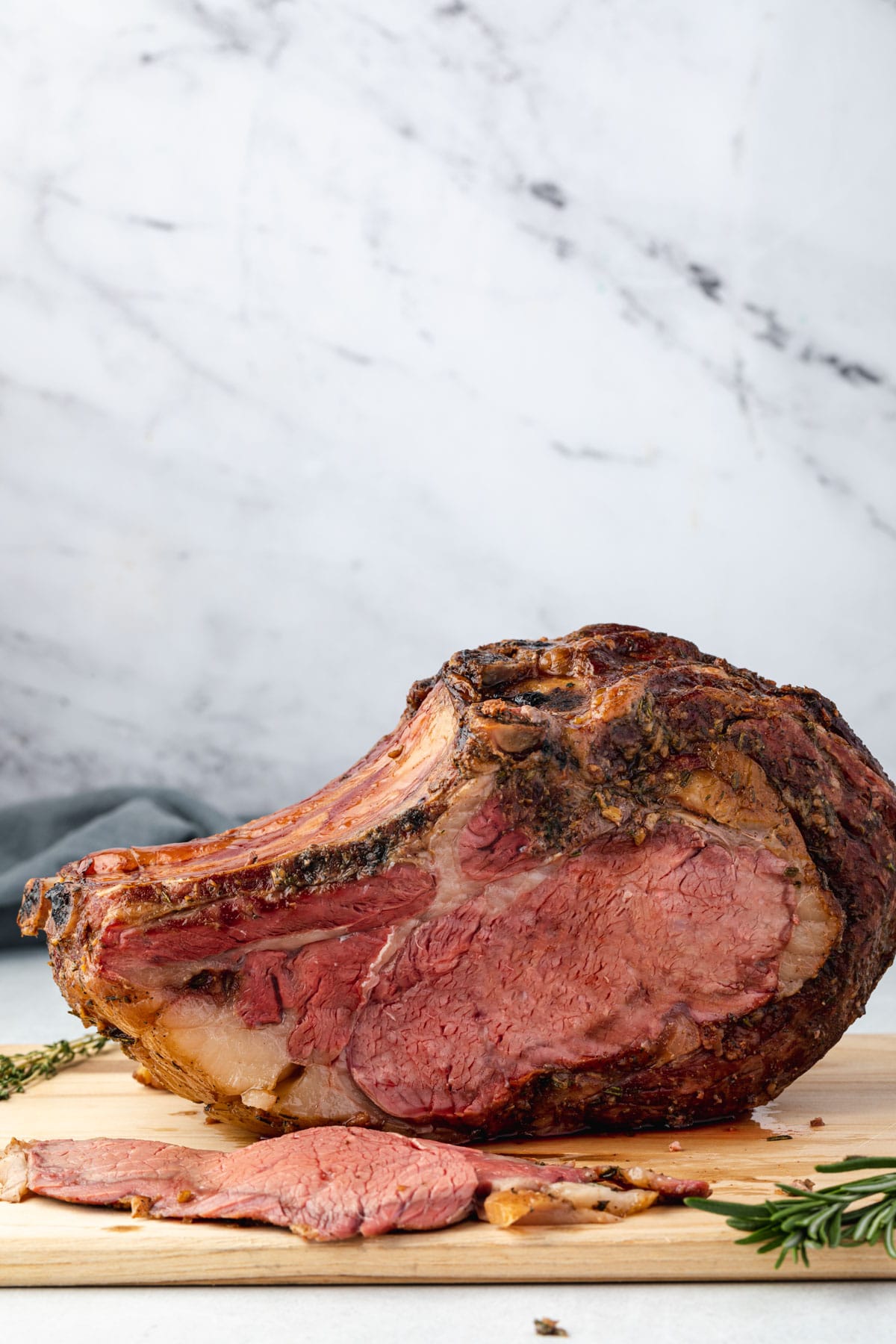
Jump to:
Special occasions are worthy of something out of this world delicious! We have chosen smoked prime rib as our Christmas dinner tradition. While it is an expensive cut of meat, the holiday season is worth some indulgences. From the smoky flavor you get from the cooking method to the succulent outer crust, this beef roast makes an incredibly delicious, impressive Christmas dinner.
One key to delicious prime rib is using a rub that complements the meat's natural flavors without overpowering them. Even though garlic herb butter has some powerful ingredients, the beef flavor still stands strong.
I think you cannot have too much garlic butter, so I love to serve it with Garlic Butter Pasta! When I am in a meat and potatoes mood, these Gruyere and Leek Mashed Potatoes have an amazing flavor that pairs beautifully with this meat!
What is Prime Rib?
Prime rib is also known as a standing rib roast. Now, don't let the term "prime" fool you! The name does not refer to the quality of the meat. It is called prime rib because it is cut from the primal rib.
For the most flavorful prime rib, you will want to choose a Prime grade of beef, the highest grade. Choice and Select grades are most commonly available at your local grocery store. While they will still be tender, they will have less flavor because they have less marbling.
Ribeye steaks are cut from prime rib, so if you are a fan of ribeyes, you will especially love this meat!
Ingredients Information
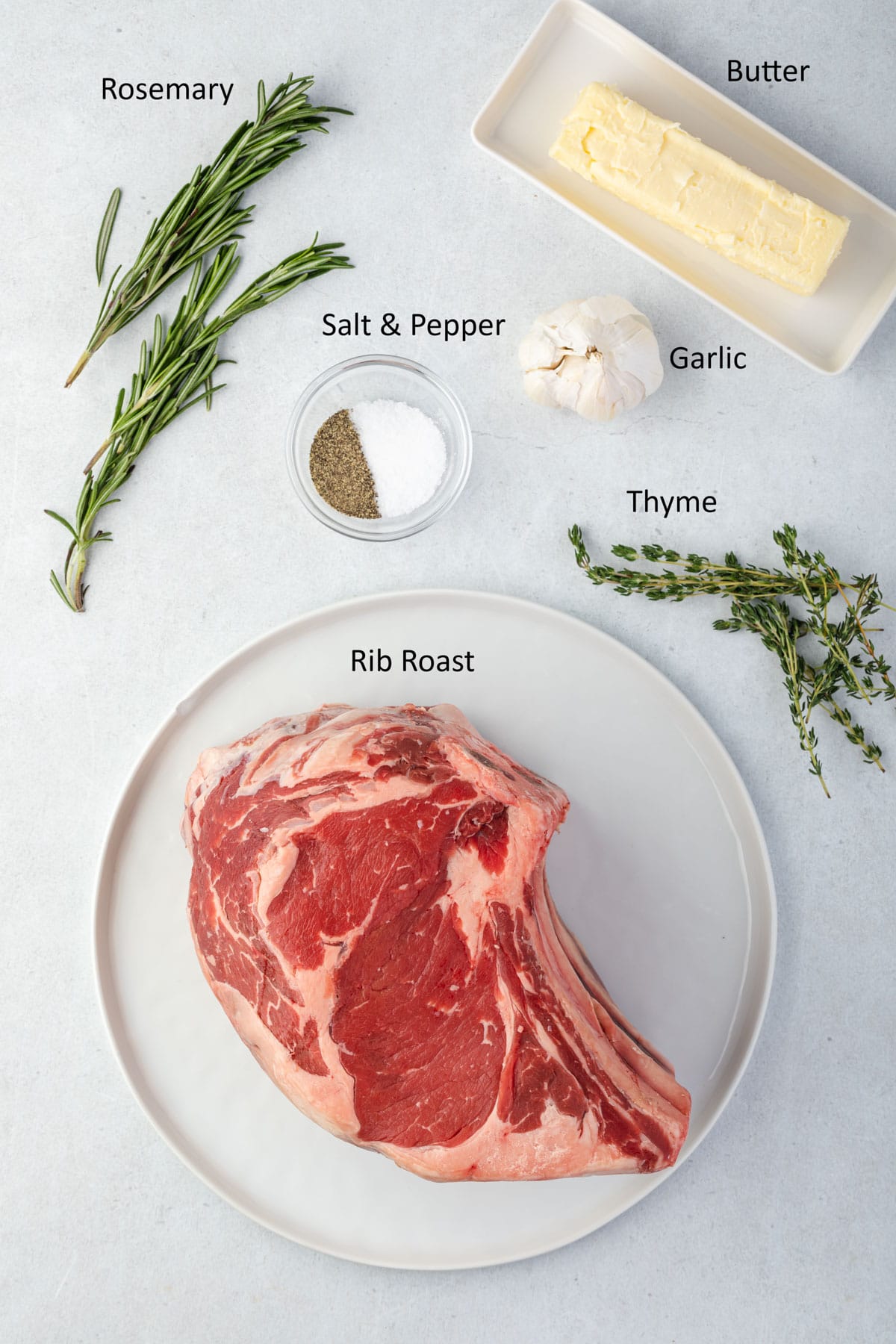
Bone-In Rib Roast: You can get a boneless prime rib roast but cooking on the bone increases the flavor. The rib bones also serve as a stand and make handling the meat easier. You can request that your butcher remove the bones and then tie them back on. This allows you to have the convenience of the bones for smoking without the work of carving the meat off the bone.
Butter: The butter's richness accentuates the prime rib's inherent richness. You can use salted or unsalted butter without much impact on the end result.
Herbs: The delicate flavors of garlic, rosemary, and thyme enhance the meat's flavor. If you do not have access to fresh herbs, you can use dried herbs. The flavor of dried herbs is more subtle than fresh, so do use fresh if possible. But if you must, substitute 1 teaspoon of the dried herb for every 1 tablespoon of fresh.
Instructions
Optional Preparation: Dry the Roast
- Purchase your prime rib 1-3 days before you plan to roast it. When you get it home from the store, unwrap it, place it in a roasting pan, and put it in your refrigerator. This is one of the few things you want to put in your refrigerator uncovered. The cold air removes moisture from food. That means the meat will be in a condition that is ready to carmelize and crust under the heat.
- This is the time when you can trim your meat if needed. Most of the time the fat cap will already be trimmed adequately. But you can cut off excess fat. Just leave at least ¼" of fat to give the roast great flavor. You can also wait to trim until carving so that all of that glorious flavor gets into the meat.
Step One: Prepare Garlic Butter
- Place the softened butter, garlic, salt, black pepper, and herbs in a food processor and pulse until smooth.
- Using a food processor to prepare the butter will leave you with course chunks of herbs. If you want your herbs to be minced finely then you can chop them by hand and fold them into the butter using a spatula, as we do with this garlic herb butter compound.
- This garlic herb rub can be prepared a day in advance and stored in the refrigerator. Bring it to room temperature an hour or two before using, so that it is easier to spread.
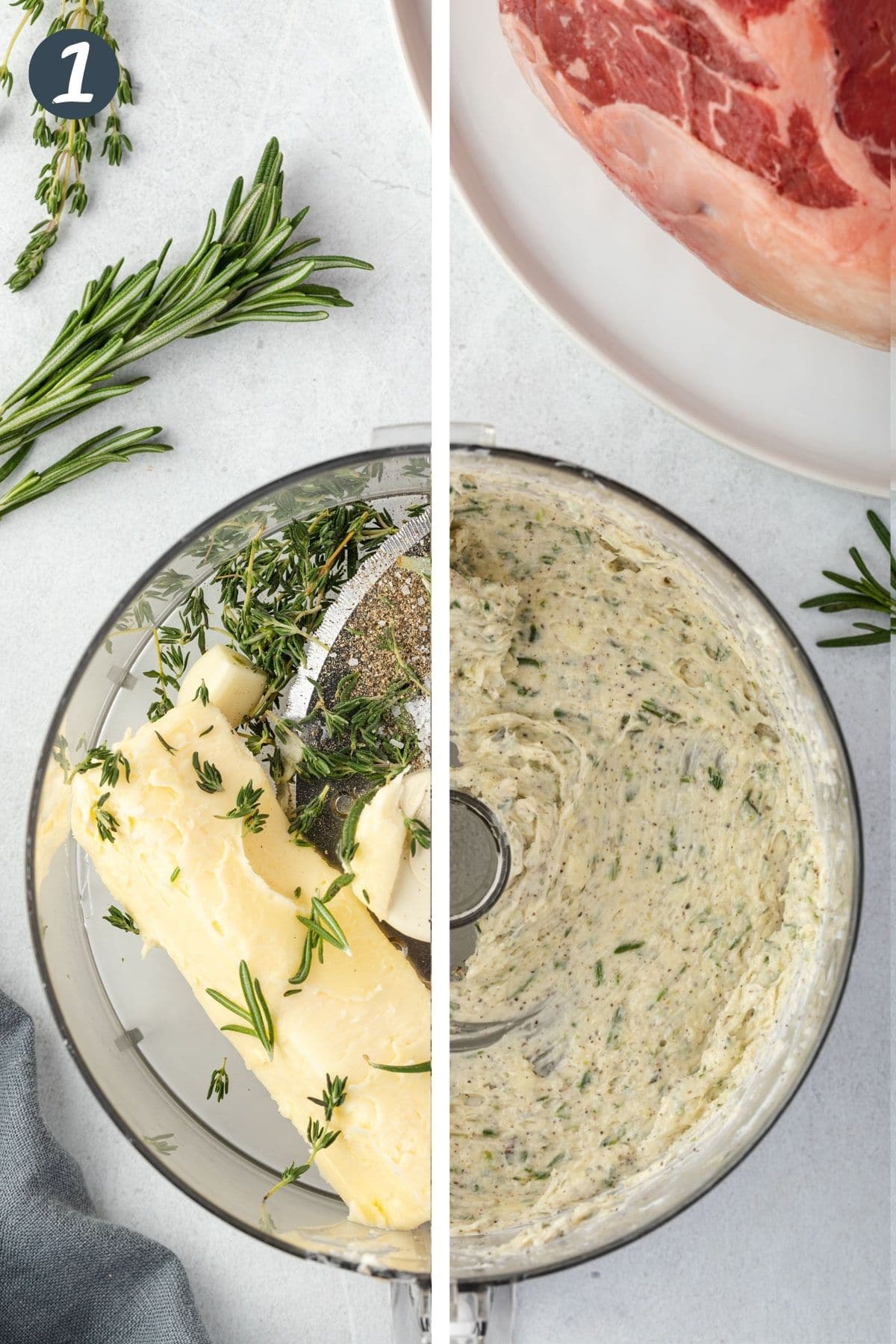
Step Two: Rub Butter onto the Roast
- One to two hours before you plan to begin smoking your meat remove it from the refrigerator and cover it with the garlic butter rub. I use my hands for this and spread the butter over the entire roast.
- Letting it sit for an hour with this rub does two things. First, it allows the meat temperature to rise. This will help your meat cook more evenly. Second, the salt in the rub will penetrate the meat, loosening the proteins, and allowing the flavors to be better absorbed.
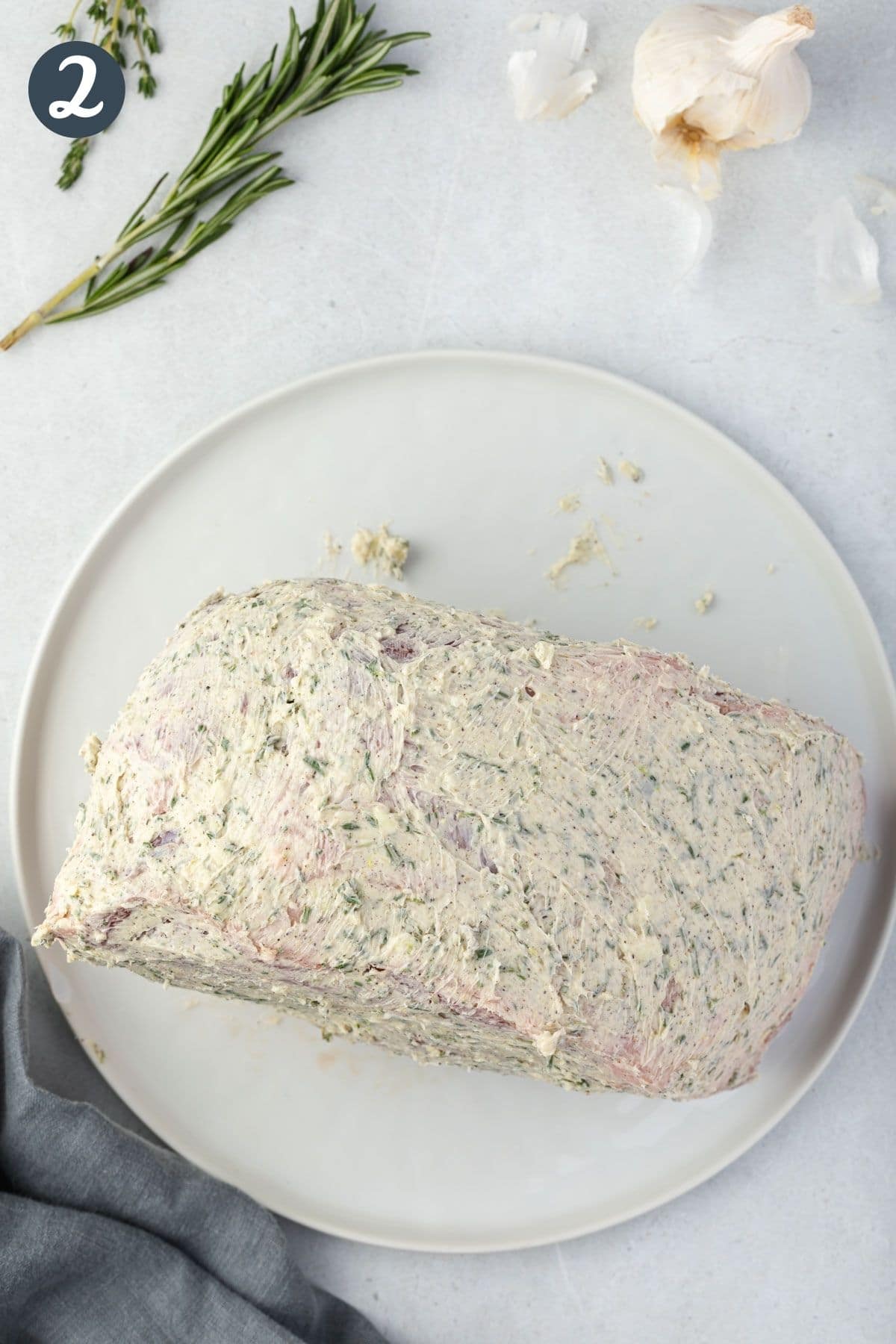
Step Three: Smoke the Meat
- Bring your grill to between 225-250°F (107-121°C). This temperature range works whether you are using a pellet smoker, electric smoker, wood, or charcoal. See the recipe notes for information on how to prepare your smoker.
- Place your seasoned prime rib on the grill over indirect heat.
- Insert your meat thermometer probe, if using. I recommend the ThermoPro Wireless Thermometer as it allows for constant monitoring up to 300 feet away.
- Close your grill and check the temperature every 45 minutes to an hour. You can adjust the temperature through either the top or side of your grill. If you are new at this choose one to work with rather than trying to control the temperature through both outlets. Here is a great article if you want to learn more about regulating the temperature of your smoker.
- Keep the grill closed as much as possible throughout the cooking process. You can judge whether or not you need to add wood chips based on the smoke coming out of the grill pipe. You should see thin wisps of smoke.
- Fill a spray bottle with apple juice and use it to put out any flare-ups. The meat will take on the flavor of the liquid you use, which is why I like to use apple juice. It adds flavor without overpowering the meat. The natural sugars also help with caramelization.
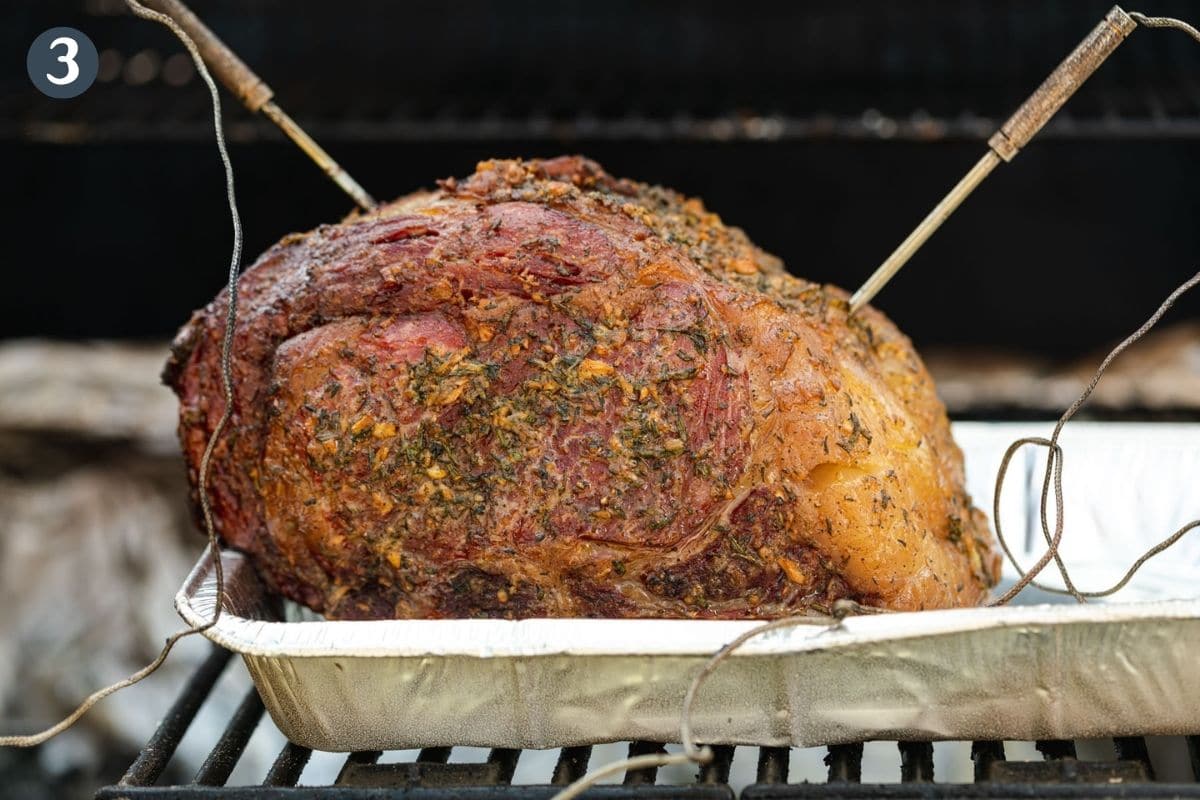
Step Four: Rest the Meat
- Once your meat is within 10 degrees of your desired temperature, remove it from the grill. The temperature will continue to rise as it rests.
- Wrap in aluminum foil and rest for a minimum of 15-30 minutes. This allows for the juices to lock in and stay in the meat as you cut the smoked prime rib.
Tools Needed
There is nothing more frustrating than getting into a project and then realizing you do not have everything you need. Here's a checklist that shows what we used while smoking our rib roast using a charcoal smoker.
- Charcoal Chimney Starter
- Apple or Cherry Wood Chips
- Charcoal Briquettes
- Lighter
- Aluminum pans (3)
- Spray bottle
- Apple Juice
- Thermometer
- High heat gloves
- Water
- Tongs
- Aluminum Foil
Cooking Time
- It takes 35 minutes per pound to achieve a medium-rare cook. Insert a temperature probe into the center of the roast to read the internal temperature.
- Plan for the time that you want to serve your meal and then count backward.
- Make sure that you allow at least 15 minutes to let the meat rest.
- I like to give myself an extra cushion, in case the meat takes longer than anticipated. You can always wrap the meat in foil and blankets, and store it in the cooler if it gets done early. Wrap in foil and place inside a cooler lined with a blanket or towel. Place another towel or blanket on top of it and close the lid. We held our prime rib for almost an hour this way and it was still hot but did not overcook.
- Print this timing guide to help you plan your meal.
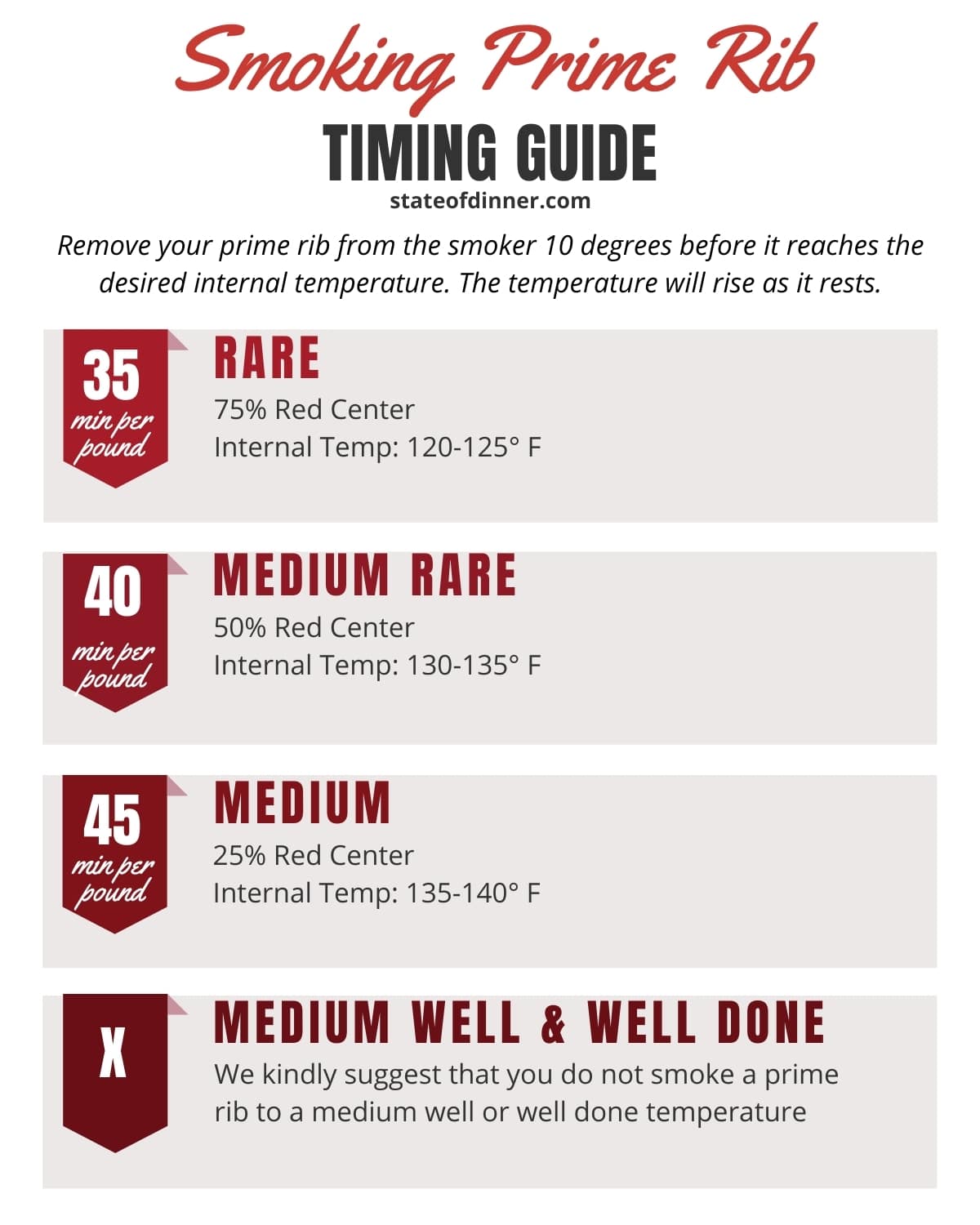
How to Carve
- Stand your meat straight up on a cutting board with the bones vertical and grip the bones with one hand.
- Slide your carving knife in between the bone and the meat, and follow the curve of the bone.
- When you get to the notch at the bottom of the bone, fold the bones away from the roast and angle your knife back towards the roast, then continue working around the bone to separate it from the meat.
- Set the back ribs aside and lay the roast onto the plate, cut-side-down.
- Hold the roast with one hand and slice the meat with the other, cutting the meat in even strokes rather than sawing.
- Prime rib is traditionally sliced in half-inch-thick slices, though you can cut as thick or as thin as you desire.
- Carve only as much as you plan to serve. This will help the meat stay warm in case people want seconds. It is also easier to store and reheat the meat if it is left intact.
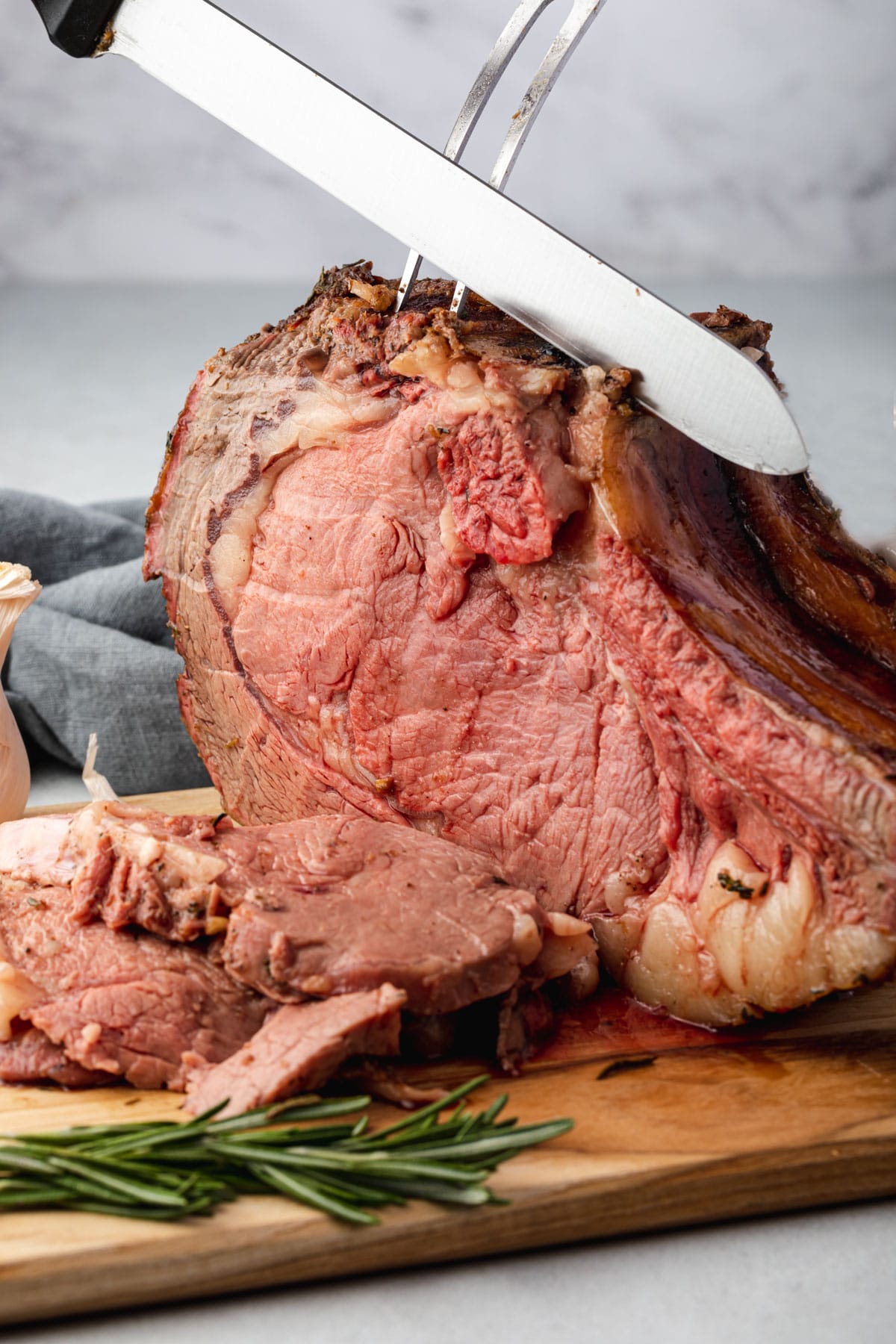
Serving Recommendations
- Condiments: The one downside to smoking your prime rib is that there are no drippings for you to use when making an au jus. You may choose to serve this with horseradish or Yorkshire pudding and skip the au jus altogether. If having au jus is important to you, you can make a no-drippings au jus with just a few simple ingredients.
- Side Dishes: Our prime rib Christmas dinner usually includes Leek & Gruyere Mashed Potatoes, Maple Roasted Butternut Squash with Cranberries, Roasted Brussels Sprouts, and a Winter Salad.
- Dessert: Enjoy some Cheesecake or homemade Brownies. Cherry Cream Cheese Pie also goes well with this dinner.
- Beverages: If you are serving wine, medium-bodied red wine with strong tannins pairs well, as the tannins provide an acidic balance to the fat of the prime rib without the wine being overpowering. We love Mount Peak Rattlesnake Zinfandel and Les Brulieres de Beychevelle Haut-Merit at our table!
Recipe FAQs
Wrap leftover prime rib tightly in plastic wrap or store in an airtight container. It will keep for 5 days in the refrigerator.
Preheat your oven to 300°F (150°C). Place the meat in a pan with ¼ cup of beef stock and place in the oven for 20-30 minutes.
This recipe has a beautiful crust and is juicy inside without searing. But you can add a sear if you prefer. I recommend a reverse sear by removing the meat 20 degrees before your desired doneness, then place in a 500°F (260°C) for 5-10 minutes, until it reaches your preferred browness.
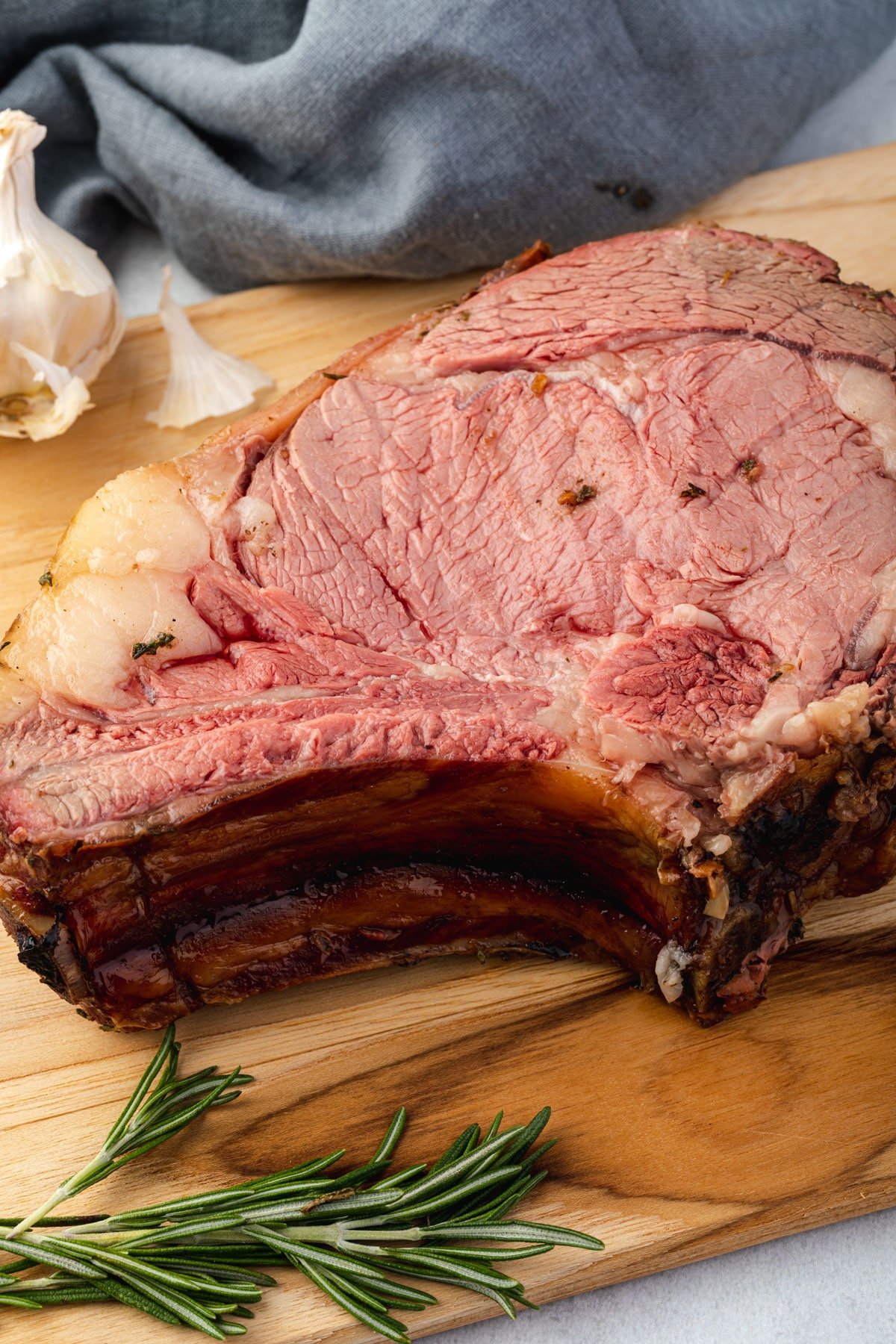
Recommended Recipes
Let me know how you like this recipe by leaving a review! And follow along on Instagram @stateofdinner for behind-the-scenes and to be among the first to know when new recipes post!
Recipe
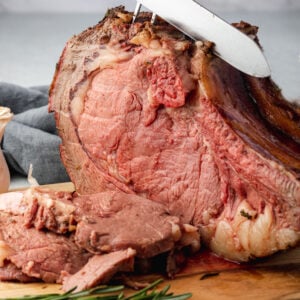
Smoked Garlic Butter Prime Rib
Recipe by:Ingredients
- 5 pound bone-in prime rib
- ½ cup unsalted butter, softened (1 stick)
- 3 sprigs rosemary (1 tablespoon minced)
- 6 sprigs finely diced thyme (1 tablespoon minced)
- 5 garlic cloves, peeled
- 1 tablespoon kosher salt
- 1 teaspoon black pepper
Instructions
- Unwrap prime rib and place in a roasting plan. Let rest in the refrigerator for 24 hours.
- Place the softened butter, rosemary, thyme, garlic cloves, salt, and pepper together in a food processor. Pulse in the food processor until the herbs are minced and distributed throughout the butter. (Alternatively, you can hand chop the herbs and mix into the butter by hand.)
- One hour before smoking, rub the butter on all surfaces of the prime rib. Let the butter-covered prime rib sit at room temperature in an aluminum pan until you are ready to put it on the grill. (At least an hour, or up to 2 hours.)
- Prepare grill, bringing the temperature to 225-250°F (107-121°C). Once it has maintained a 225°F degree temperature for 15 minutes, place your prime rib (still in the aluminum pan) on the side of the grill opposite the coals. Close the grill lid.
- Check the temperature of your grill hourly and adjust the coals, as needed to maintain a 225-250°F (107-121°C) temperature.
- Smoke the prime rib for 35 minutes per pound to achieve rare doneness, 40 minutes per pound for medium-rare, and 45 minutes per pound for medium meat.
- Once the internal temperature of the meat has reached your desired doneness, remove it from the grill, wrap in foil, and let rest for 15-30 minutes before carving.
Notes
- Refrigerate leftovers in an airtight container for up to 5 days.
- Reheat in a 300°F (150°C) oven with ¼ cup of beef stock for 20-30 minutes.
- Use a charcoal chimney starter in order to have your coals hot and ready. This will also allow you to have some coals hot and ready to go in case the temperature starts to dip.
- While the coals are heating, soak your wood chips for about 20 minutes.
- I recommend using a fruit wood chip such as cherry or apple wood. This will give a mild flavor without overpowering the meat. After all, this is prime rib and you don't spend this much on meat just to taste mesquite.
- With your coals now ashy and gray they are ready to be placed on the grill.
- Put your aluminum pan in the grill and then surround it with hot coals.
- Place the pan on the right side and the coals on the left side.
- With these in place remove your wood from the water and place them on the coals. Using direct heat creates a more consistent smoked flavor.
Nutrition
The nutritional facts provided are only estimates. The accuracy of the nutritional information for any recipe on this site is not guaranteed.
This recipe was originally published in January 2021. It was updated in April 2022 to add new images and additional helpful information.

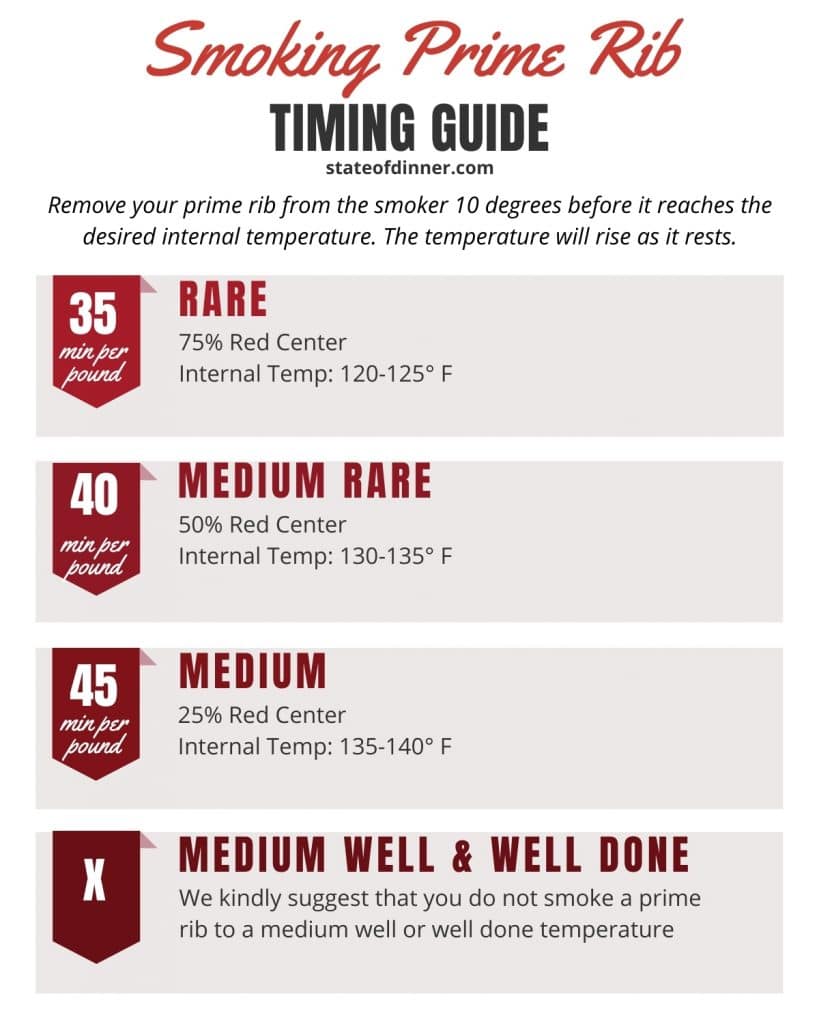
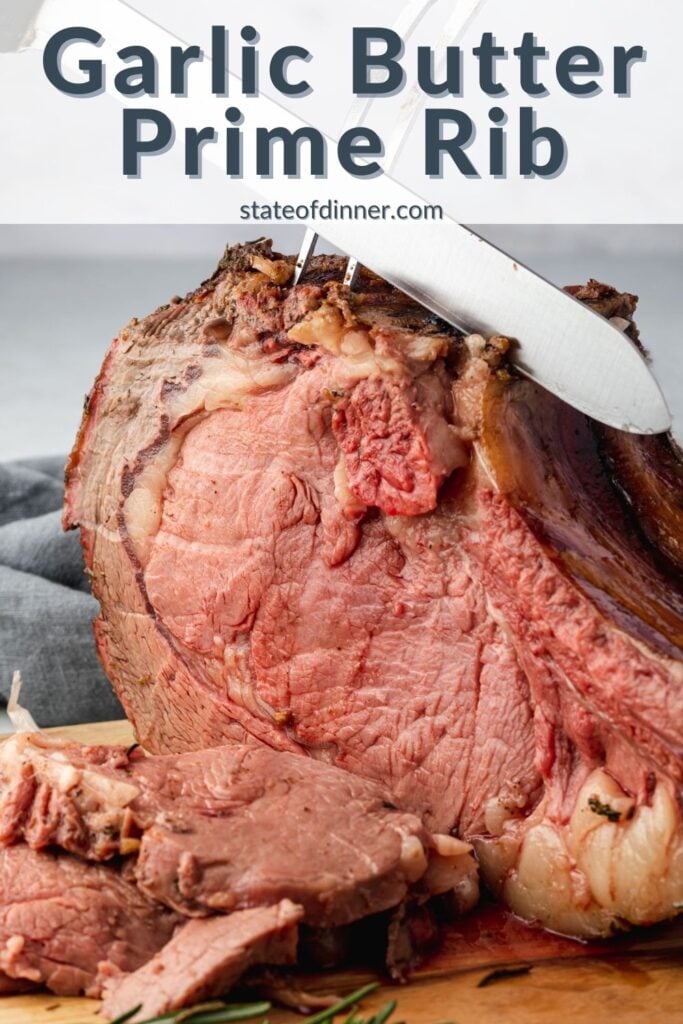
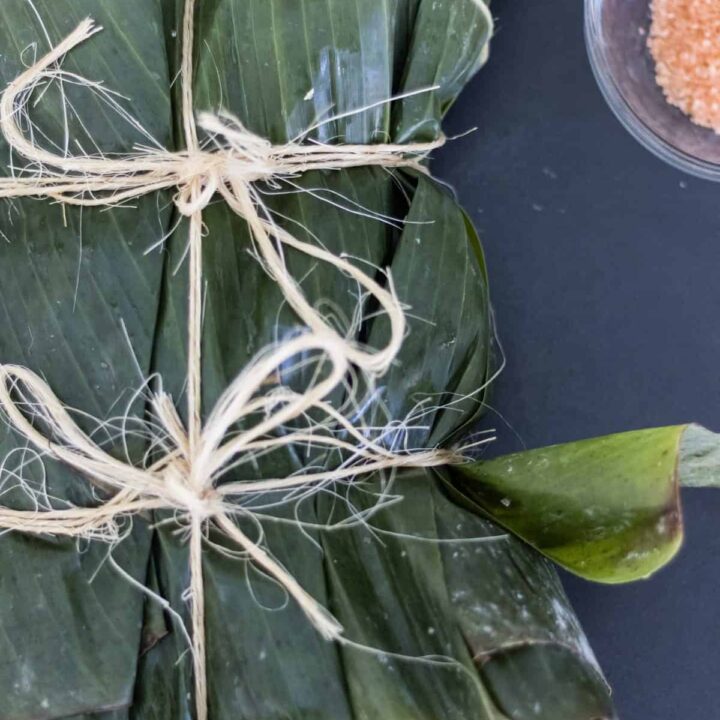
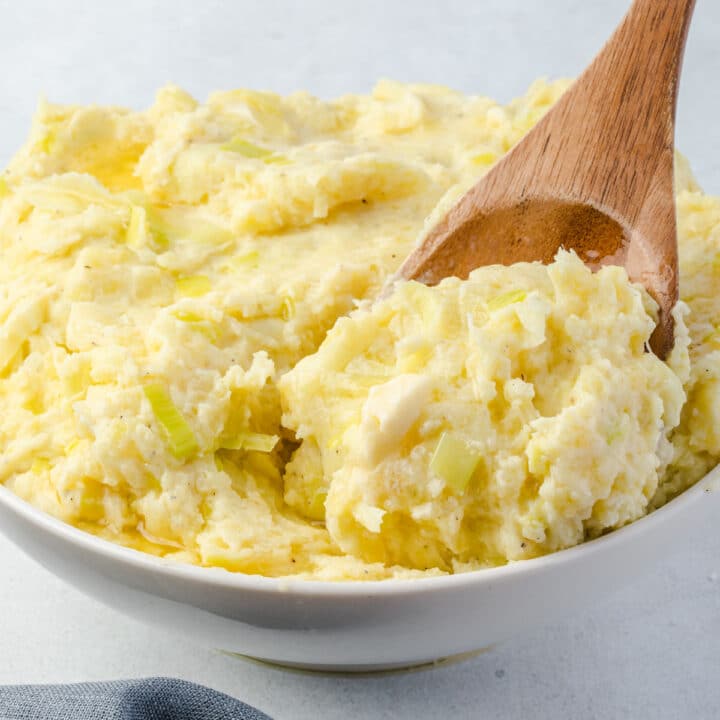
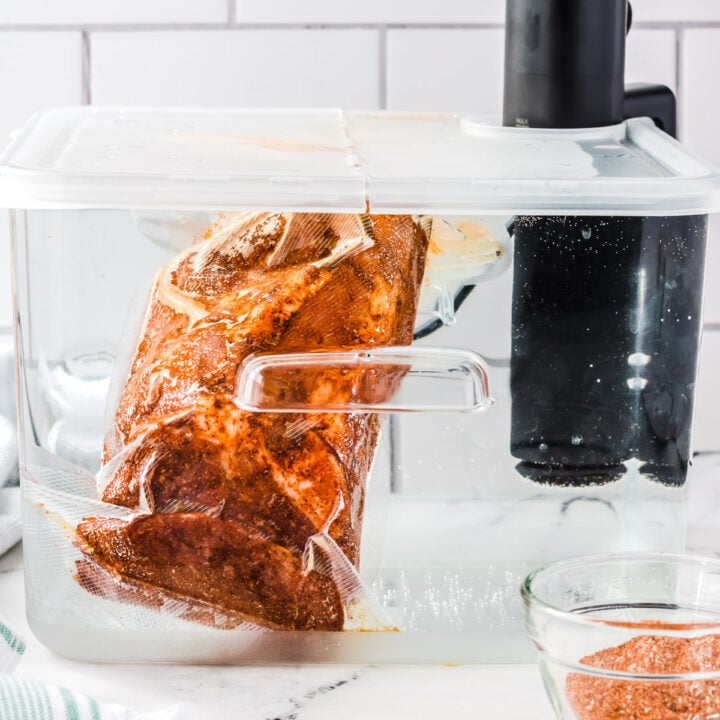
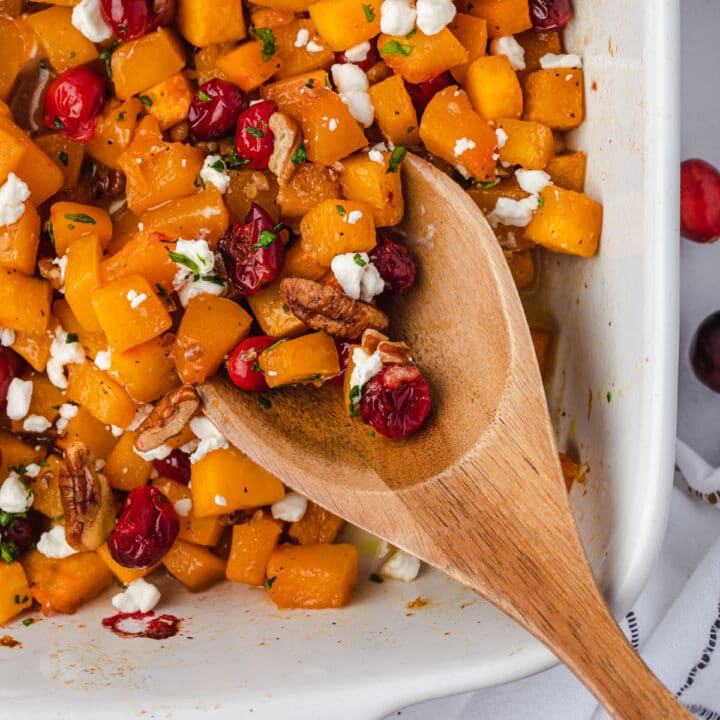
Lima Ekram says
I have never smoked meat before - I will give this a try! Thank you for the detailed instructions!
Matt says
This is my favorite meat to smoke. So delicious and I enjoy watching everyone’s reaction to eating it. It’s delicious, and although may sound daunting, with this guide it is easy to do.
Erin Gierhart says
Isn't it the best feeling when you serve something that everyone devours? Thank you for sharing your love of this recipe!